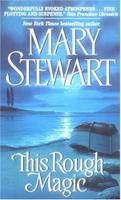Lucy Waring is an aspiring actress on the London stage, whose latest play has just folded. So, she comes to the Greek isle of Corfu for an idyllic holiday with her sister, who happens to be married to a wealthy Roman lawyer, and owns some property on the island. But, of course, this is Mary Stewart, so the idyllic vacation is quickly swallowed up by mystery and adventure. It is almost inevitable that our intelligent and brave heroine will meet two men, both handsome, and that one will be a villain, and the other will become a villain. Can you guess which?
The book's title, of course, is from The Tempest, near the end of the play when Prospero is calling an end to his own magic-making:
But this rough magicThere are plenty of references to Shakespeare's play throughout the text. Each chapter begins with an appropriate line or two as epigraph. One of the characters staying on the island is a famous actor, Julian Gale, now living in seclusion. The last role he played was Prospero, and he believes Corfu is the "real" island of the Tempest. There is even a certain conflation with Prospero and the patron saint of the island, St. Spiridion. Many of the boys on the island are named after this saint, and the shortened version of the name, Spiro, sounds even more like Prospero. There is a rather delightful moment when a character thinks that her boyfriend has found proof that Prospero really was on the island, because they have found something that looks like a book hidden underwater, but it is actually proof of the misdeeds of the book's villain. I was a little disappointed that there was no real conclusion to this idea of Corfu being Prospero's isle, no huge connection to the world of the tempest or to the "rough magic" of the title. Stewart does bring those words in near the end, as if to justify the title:
I here abjure, and, when I have required
Some heavenly music, which even now I do,
To work mine end upon their senses that
This airy charm is for, I'll break my staff,
Bury it certain fathoms in the earth,
And deeper than did ever plummet sound
I'll drown my book.
"You've seen the other face of the enchanted isle tonight, haven't you, my poor child? It's a rough sort of magic for such as we are-a mere musician, and a couple of players."
There is also a dolphin in the book, who is mostly present to service the plot, but he gives a few moments of delight. When Lucy first sees him, she notices that someone is shooting at the dolphin with a silencer, and after scaring the dolphin away, she charges up to yell at the only person she can see nearby (who, of course, turns out to be innocent-- although Lucy stubbornly refuses to believe this for some time). Later on, the dolphin strands himself on the beach at night, and Lucy, with a little bit of help, manages to get him back into the water before he dehydrates and dies. Still later, the dolphin returns the favor, and in his turn saves Lucy. It seems a little bit unrealistic, and romantic-- but perhaps also a bit like a friendly spirit such as Ariel, helping out those who are shipwrecked on Prospero's isle.
I was a bit surprised to read on Amazon that several reviewers counted This Rough Magic as one of their favorite Mary Stewart novels, along with Nine Coaches Waiting. Perhaps it is only because I have read enough of Mary Stewart, but I found the plot rather predictable. I guessed fairly early on that the man Lucy was initially most resistant to and suspicious of would be the one she would eventually fall in love with; I suspected the villain's actions had something to do with the political turmoil in Albania, when it was mentioned, although I'm not familiar enough with this kind of illegal maneuvering to guess what the specific crime might be. I was also a little troubled by the portrayal of the natives; Stewart's portrayal of the Greeks seemed a bit racist. She stereotypes them all as delighting to serve, and when it is a matter of one man's word against another, the Greek police are inclined to believe an educated European man rather than a Corfiote boy. This Rough Magic is certainly well-written and entertaining, but I don't feel that it is on quite the same level as Stewart's best work (including the superb and rightly praised Nine Coaches Waiting).
| Title: | This Rough Magic |
|---|---|
| Author: | Mary Stewart |
| Date published: | 1964 |
| Genre: | Mystery / Romance |
| Number of pages: | 254 |



0 comments:
Post a Comment